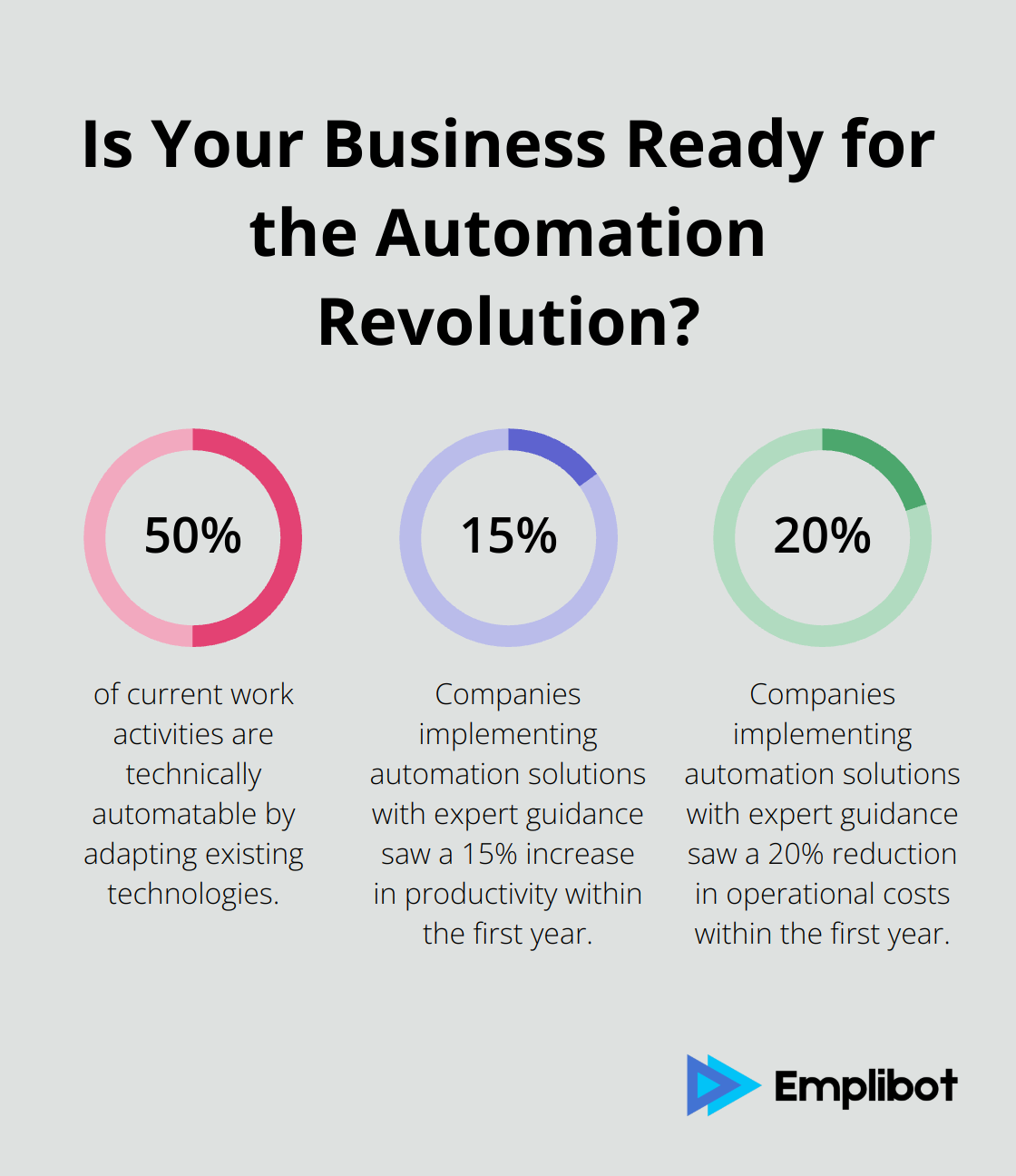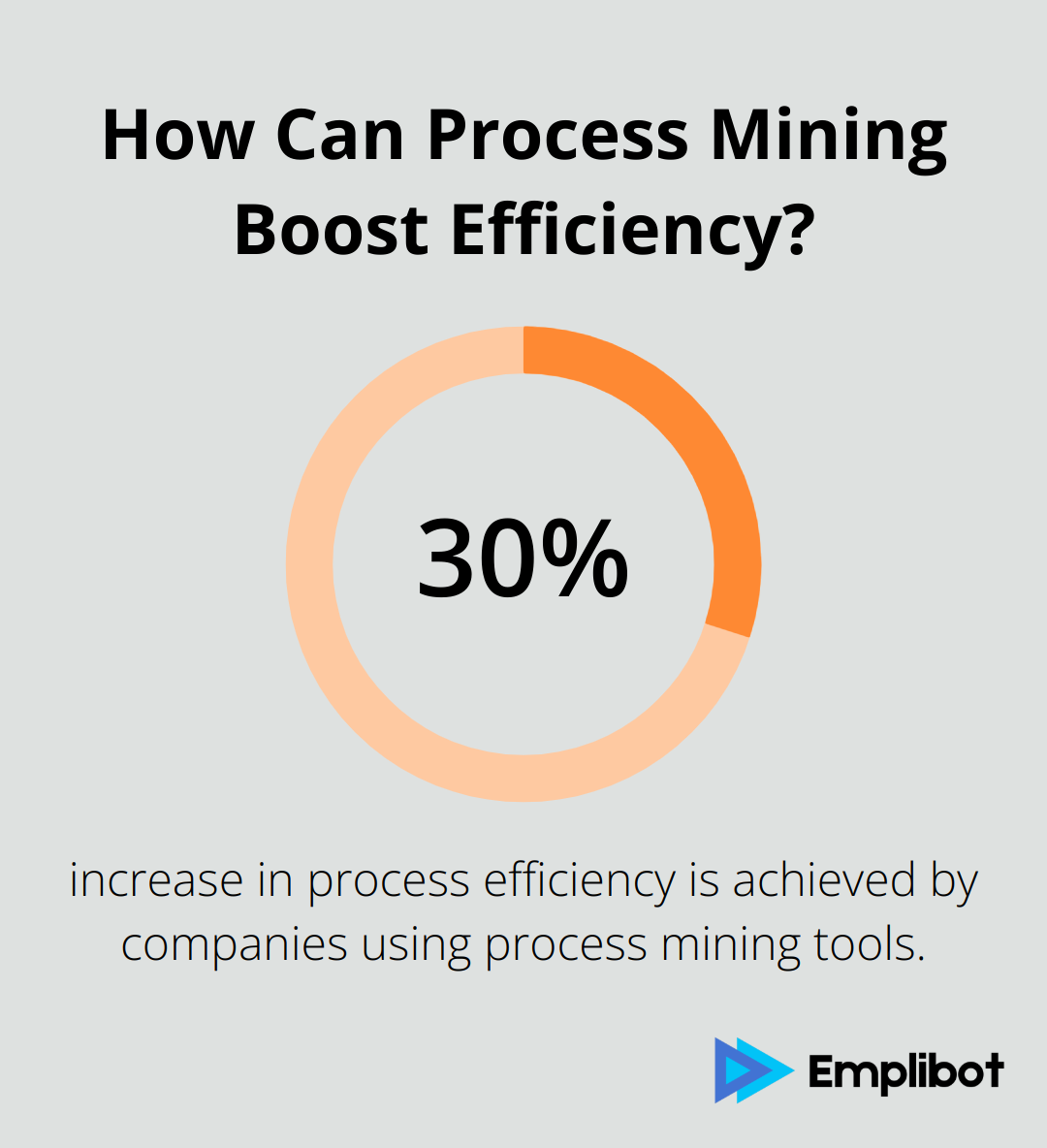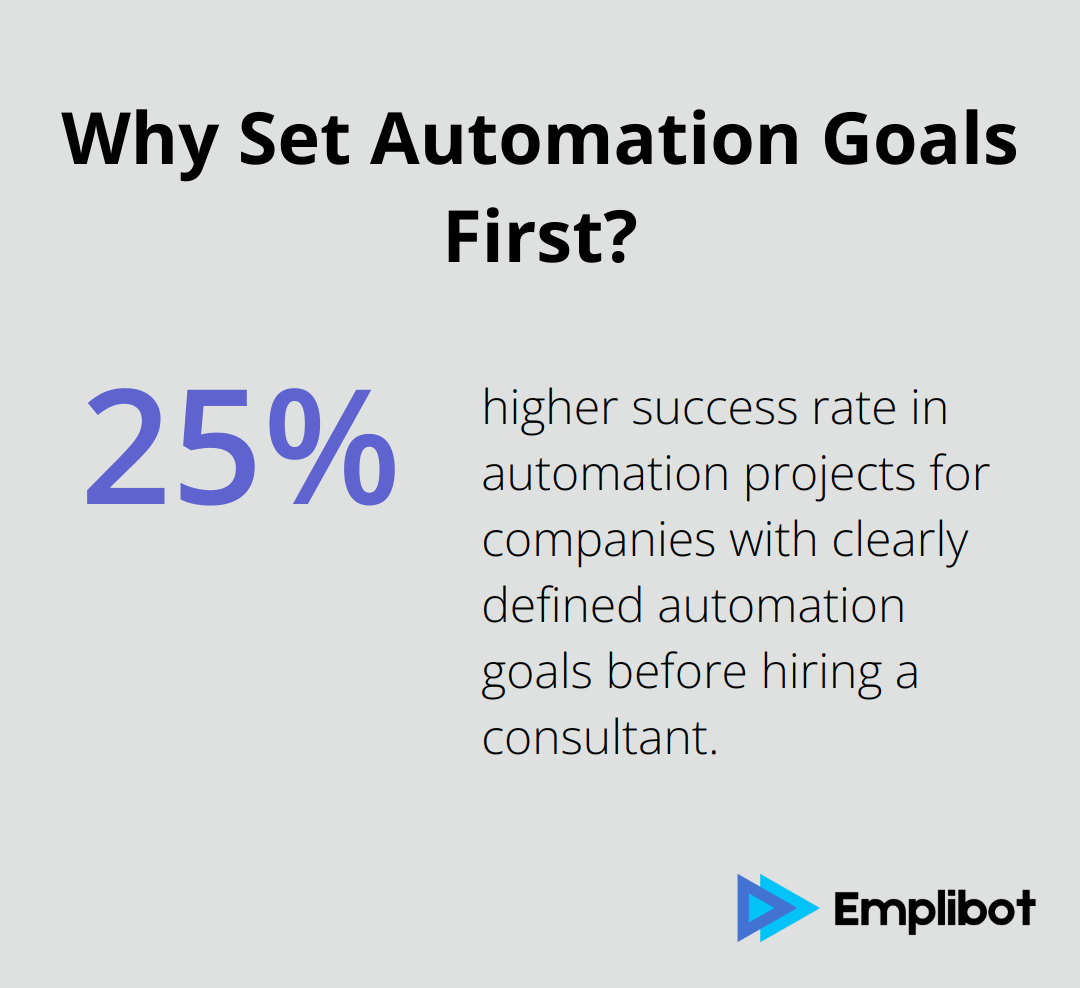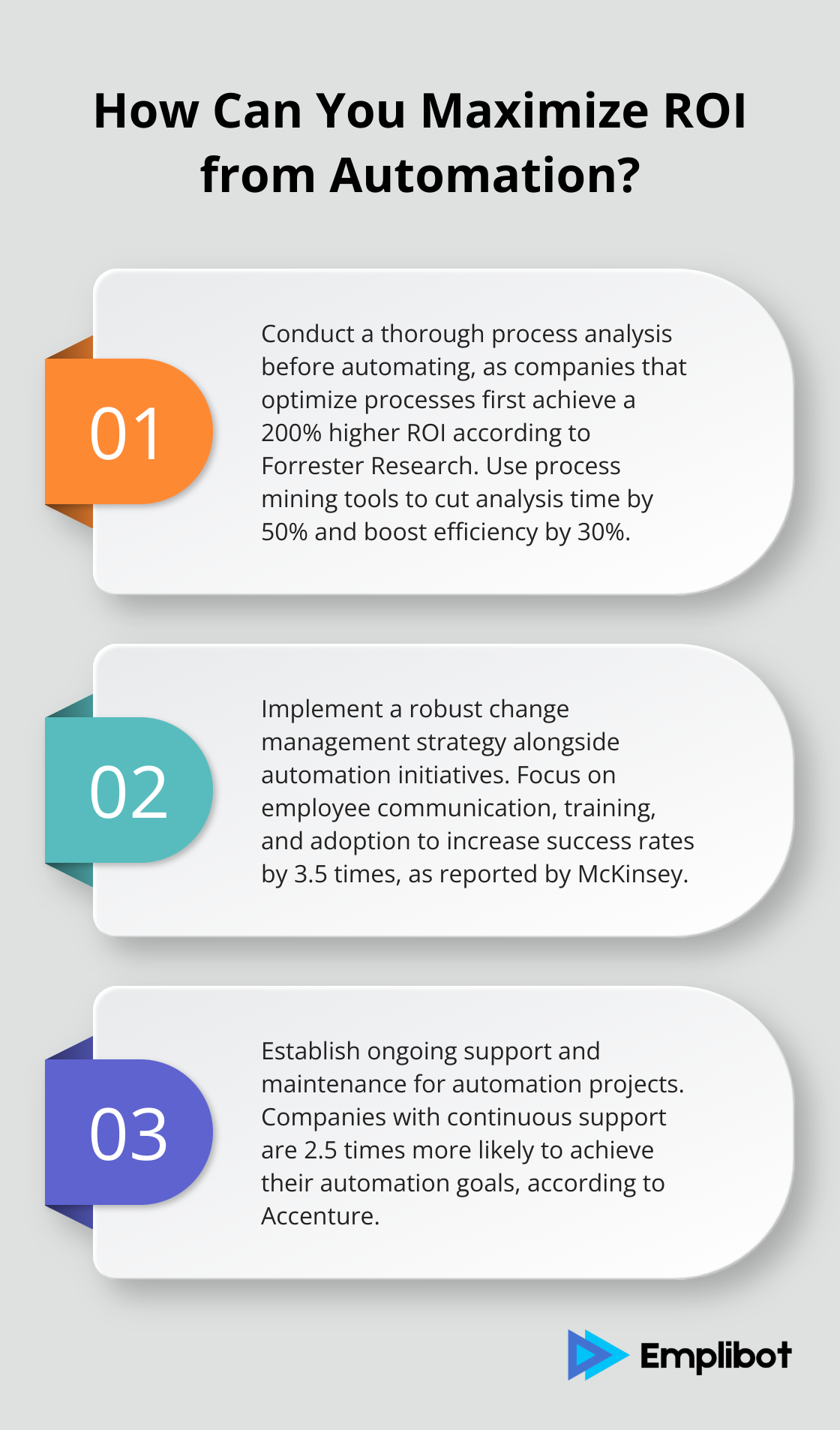Business automation consulting is transforming how companies operate in today’s fast-paced digital landscape. At Emplibot, we’ve seen firsthand how automation can streamline processes, boost productivity, and drive growth across industries.
This guide will walk you through the essentials of business automation consulting, from understanding its scope to choosing the right consultant for your needs.
What is Business Automation Consulting?
Business automation consulting helps companies streamline their operations through technology. It identifies repetitive tasks and processes that can be automated, which frees up human resources for more strategic work.
The Scope of Automation Consulting
Automation consulting covers a wide range of business functions. A recent McKinsey report states that 50% of current work activities are technically automatable by adapting existing technologies. This includes areas like:
- Data entry
- Customer service
- Inventory management
- Financial reporting
In the finance sector, automation can reduce the time spent on transaction processing by up to 80%. In manufacturing, automated quality control systems can inspect products 10 times faster than human workers, with higher accuracy.
Key Focus Areas in Automation
Process Mapping
Process mapping involves a detailed analysis of existing workflows to identify bottlenecks and inefficiencies. A study by Forrester Research found that companies that invested in process mapping before automation saw a 200% higher ROI compared to those that didn’t.
Technology Assessment and Implementation
This area includes evaluating various automation tools and platforms to find the best fit for a company’s specific needs. Robotic Process Automation (RPA) automates routine, repetitive, and rule-based tasks with high accuracy and low investment.
The Benefits of Hiring an Automation Consultant
Hiring a business automation consultant can yield significant benefits. A report by Deloitte showed that companies implementing automation solutions with expert guidance saw a 15% increase in productivity and a 20% reduction in operational costs within the first year.

Moreover, automation consultants bring specialized knowledge that can help avoid costly mistakes. The same Deloitte study found that 30-50% of initial RPA projects fail when implemented without expert guidance. With a consultant, the success rate jumps to over 80%.
Automation consultants also help in change management, which is essential for successful implementation. According to a survey by McKinsey, companies that focused on change management were 3.5 times more likely to outperform their peers.
While many automation consulting firms exist, some (like Emplibot) offer unique approaches. For example, some consultants focus on automating content marketing processes, which can save businesses up to 30 hours per week on content creation and distribution tasks. These automated systems can handle everything from keyword research to content creation and social media posting, allowing businesses to focus on their core competencies while still maintaining a strong online presence.
As we move forward, let’s explore the core services offered by business automation consultants and how they can transform your company’s operations.
What Do Business Automation Consultants Actually Do?
Process Analysis and Optimization
Business automation consultants start by analyzing existing processes. They use advanced tools to map workflows, identify bottlenecks, and spot inefficiencies. The Process Excellence Network reports that companies using process mining tools cut their analysis time by 50% and boost process efficiency by 30%.

Consultants collaborate with your team to redesign these processes for optimal efficiency. This often involves:
- Eliminating redundant steps
- Streamlining workflows
- Identifying tasks suitable for automation
A Forrester Research report highlights that companies optimizing processes before automation achieve a 200% higher return on investment compared to those that don’t.
Technology Selection and Implementation
After process optimization, consultants assist in selecting and implementing the right automation technologies. They evaluate various tools and platforms to find the best fit for your specific needs. A Gartner report states that 80% of organizations failing to align their automation tools with business goals see little to no benefit from their automation initiatives.
Consultants oversee the implementation process, ensuring smooth integration with existing systems. They also set up monitoring and analytics tools to track automated process performance. A Deloitte study found that companies implementing automation solutions with expert guidance experienced a 15% productivity increase within the first year.
Change Management and Training
Implementing automation often requires significant changes in employee workflows. Consultants play a vital role in managing this transition. They develop change management strategies, communicate automation benefits to employees, and provide comprehensive training programs.
A McKinsey survey revealed that companies focusing on change management were 3.5 times more likely to outperform their peers in automation initiatives. Effective change management can increase employee adoption rates by up to 80% (according to a Prosci study).
Consultants also help identify skill gaps and develop training programs to upskill employees. A World Economic Forum report predicts that by 2025, 50% of all employees will need reskilling due to increased automation adoption.
Ongoing Support and Maintenance
The work of automation consultants doesn’t end with implementation. They provide ongoing support and maintenance to ensure the continued success of automation initiatives. This includes:
- Monitoring system performance
- Troubleshooting issues
- Updating and optimizing automated processes
A study by Accenture found that companies with ongoing support for their automation initiatives were 2.5 times more likely to achieve their automation goals compared to those without such support.
As we explore the services offered by business automation consultants, it’s important to understand how to choose the right consultant for your specific needs. Let’s examine the key factors to consider when selecting a business automation consultant.
How to Select the Perfect Business Automation Consultant
Evaluate Your Automation Needs
Before you start your search, take a close look at your company’s processes. Identify areas where automation could have the most significant impact. A recent survey by Deloitte shows that companies with clearly defined automation goals before hiring a consultant experienced a 25% higher success rate in their projects.

Create a prioritized list of processes you want to automate. This could include data entry, customer service, inventory management, or financial reporting. Be specific about your goals. Do you want to reduce costs, improve accuracy, or free up employee time for more strategic tasks?
Look for Industry-Specific Expertise
When you evaluate consultants, prioritize those with experience in your industry. A McKinsey study found that generative AI’s impact on productivity could add trillions of dollars in value to the global economy. They understand the unique challenges and regulations of your sector and can provide tailored solutions.
For example, if you work in e-commerce, look for consultants who have successfully automated order processing or inventory management for similar businesses. If you operate in healthcare, seek out experts who understand HIPAA compliance and patient data management.
Assess Technical Proficiency
The best automation consultants know a range of technologies. They should understand popular automation tools like UiPath, Blue Prism, or Automation Anywhere. However, they shouldn’t tie themselves to a single platform. According to Gartner, consultants who are vendor-agnostic and can recommend the best tool for each specific need deliver 30% better results.
Ask potential consultants about their experience with different technologies. Can they integrate automation solutions with your existing systems? Do they stay updated on emerging technologies like AI and machine learning?
Check Their Track Record
Past performance indicates future success. Ask for case studies and client references. A study by the Harvard Business Review found that consultants with a proven track record of successful projects were 3 times more likely to deliver positive results.
When you review case studies, look for projects similar to yours in scale and complexity. Pay attention to measurable outcomes. Did the consultant help their clients achieve significant cost savings or productivity improvements? For instance, if a consultant claims they helped a company reduce processing times by 50%, ask for specifics on how they achieved and measured this.
Don’t just rely on the consultant’s word. Reach out to their past clients directly. Ask about the consultant’s communication style, ability to meet deadlines, and how they handled challenges during the project.
Consider Change Management Skills
Implementing automation often requires significant changes in how employees work. The best consultants don’t just focus on technology; they also excel at managing the human side of change. A study by Prosci found that projects with excellent change management were six times more likely to meet or exceed objectives.
Ask potential consultants about their approach to change management. How do they plan to communicate the benefits of automation to your team? What strategies do they use to overcome resistance to change? Look for consultants who emphasize training and support for your employees throughout the automation process.
Selecting the right business automation consultant is an important step in your digital transformation journey. Through thorough assessment of your needs, evaluation of expertise, and verification of track records, you can find a consultant who will guide your company towards successful automation (and long-term success).
Final Thoughts
Business automation consulting has become essential for companies that want to excel in the digital age. These consultants provide expertise in streamlining operations, increasing productivity, and fostering growth across industries. Studies show that businesses embracing automation technologies experience significant improvements in efficiency and cost savings.

Companies should approach automation strategically by defining clear goals and identifying high-impact areas. Successful automation requires process optimization and effective change management, not just new technology implementation. Selecting the right consultant with industry-specific experience and a proven track record can significantly influence the success of an automation project.
The field of business automation consulting continues to evolve, with a focus on intelligent automation and human-machine collaboration. Tools like Emplibot automate content marketing processes, allowing businesses to maintain a strong online presence while concentrating on core competencies. As automation technologies advance, partnering with experienced consultants will help companies stay competitive in an increasingly digital business world.

